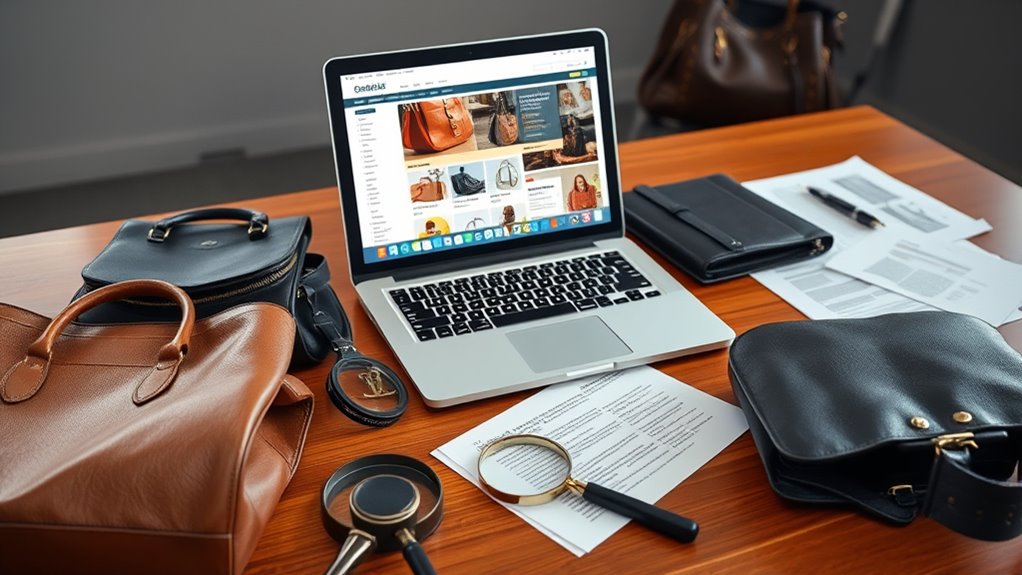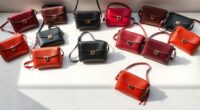Reselling designer bags online requires understanding trademarks, authenticity rules, and proper documentation to avoid legal issues. You need to verify that bags are genuine, keep proof of provenance, and follow brand-specific resale policies. Choosing platforms with clear guidelines helps protect your business from infringing on trademarks or selling counterfeits. Properly listing items, managing disputes, and complying with tax and licensing laws ensure your resale journey stays legal and trustworthy. Keep exploring to learn more about staying compliant and successful.
Key Takeaways
- Comply with intellectual property laws and brand trademarks to avoid infringement and legal action when reselling designer bags.
- Verify authenticity using official certificates and provenance documentation to prevent counterfeit sales and legal disputes.
- Understand each brand’s resale policies and restrictions to ensure listings align with legal and brand-specific guidelines.
- Register with local authorities and obtain necessary licenses or permits to legally operate an online designer bag resale business.
- Use secure payment systems and transparent descriptions to protect customer rights and mitigate fraud risks.
Understanding Intellectual Property Rights and Trademarks
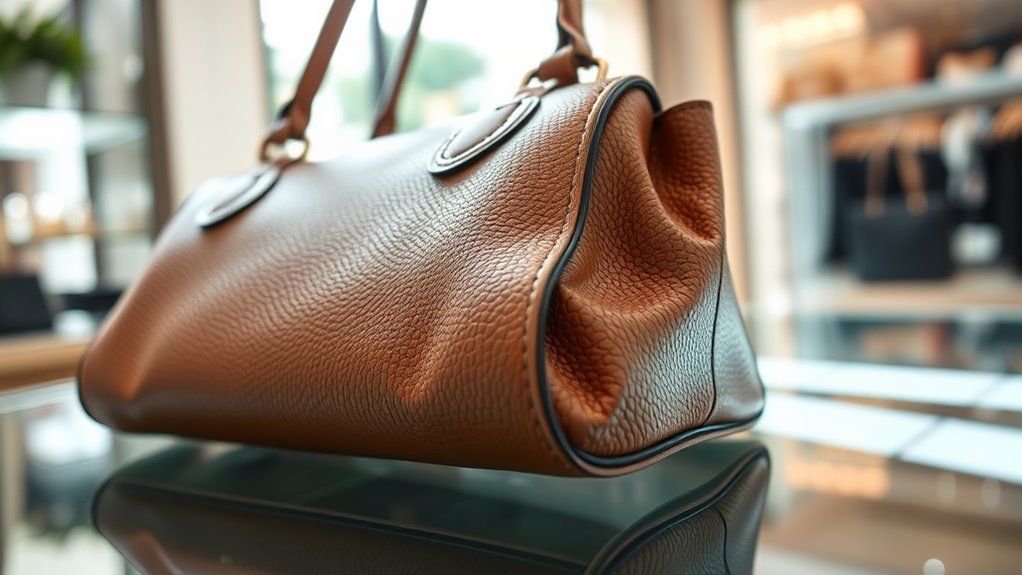
Understanding intellectual property rights and trademarks is vital when reselling designer bags online because these laws safeguard the brand’s identity and guarantee authenticity. Knowing how to identify counterfeit products is essential for protecting your reputation and avoiding legal trouble. Counterfeit detection involves examining logos, stitching, materials, and packaging to spot fake items. Respecting intellectual property enforcement means understanding that brands actively defend their trademarks against unauthorized use. Selling genuine designer bags requires you to comply with these laws, ensuring you don’t infringe on trademarks or contribute to counterfeit markets. By staying informed on legal standards and practicing thorough counterfeit detection, you protect yourself from legal risks and build trust with your customers. Additionally, using aesthetic wall organization techniques can help create a professional and appealing presentation for your online store, enhancing customer confidence. Ultimately, respecting intellectual property rights helps you maintain a reputable and compliant reselling business.
Authenticity Verification and Its Legal Implications
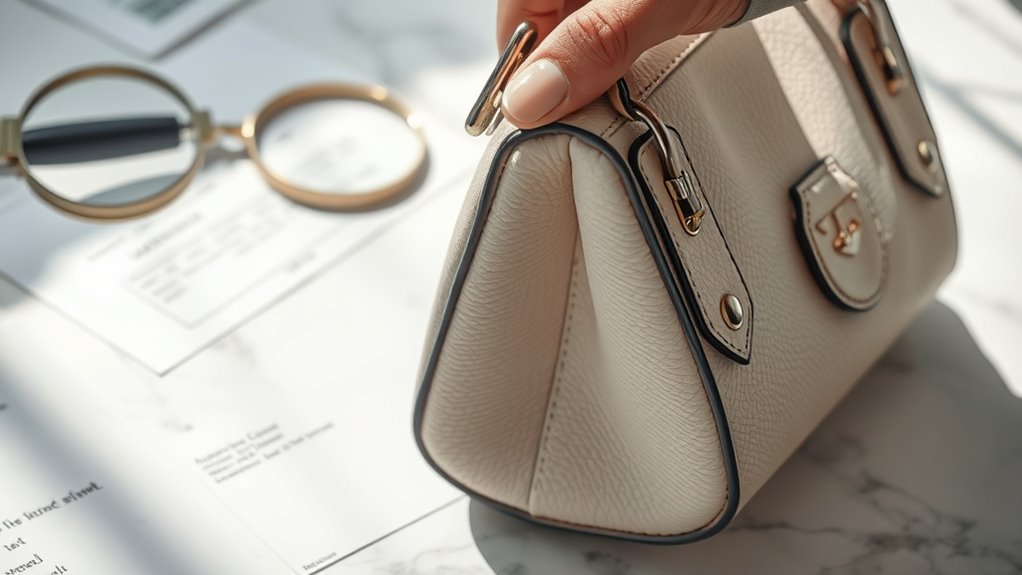
Verifying the authenticity of designer bags is a key step in maintaining a trustworthy reselling business. Counterfeit detection is essential to guarantee you’re selling genuine products and to avoid legal issues. Online authenticity tools can assist you in this process by analyzing images and details to confirm a bag’s legitimacy. These tools compare features such as logos, stitching, hardware, and materials against official standards. Using reliable verification methods not only protects your reputation but also safeguards you from potential legal claims related to selling counterfeit items. Keep in mind that misrepresenting a bag’s authenticity, even unintentionally, could lead to copyright infringement or fraud charges. Consequently, investing in accurate authentication methods is vital for maintaining legal compliance and building consumer trust. Additionally, understanding color accuracy and how it affects product presentation can help ensure your listings reflect the true quality of the bags you sell.
Proper Documentation and Provenance of Designer Bags
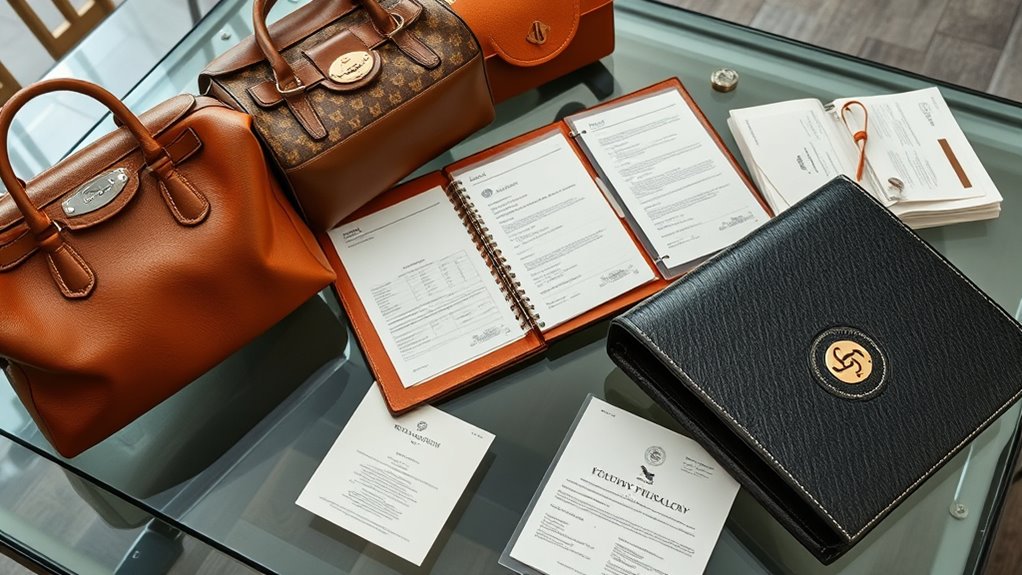
You need to have proper documentation, like authenticity certificates, to prove your designer bag’s legitimacy. Provenance records are vital for establishing a bag’s history and value. Without these documents, buyers may question the authenticity and your credibility as a seller. Incorporating detailed textile art techniques can also demonstrate craftsmanship and authenticity, further reassuring potential buyers.
Authenticity Certificates Required
Authenticity certificates are essential when reselling designer bags online because they provide proof that the item is genuine. These certificates support authentication procedures by confirming the bag’s origin and verifying its brand markings. They help you demonstrate to buyers that the product has undergone counterfeit detection and passed rigorous scrutiny. Having a legitimate certificate can prevent disputes and protect you from legal issues related to selling counterfeit items. Make sure your certificates include detailed information, such as the brand, model, serial number, and purchase history. Proper documentation not only boosts buyer confidence but also reinforces your credibility as a seller. Always verify that your authenticity certificates are issued by recognized experts or authorized sources to ensure their validity.
Provenance Documentation Importance
Proper documentation of a designer bag’s provenance is essential because it establishes a clear ownership history and authentic origin, which can profoundly influence its value and desirability. In the luxury market, verified provenance boosts buyer confidence and supports resale ethics. To guarantee your bags are legitimately valued, focus on:
- Tracking original receipts and purchase records to confirm authenticity.
- Maintaining detailed records of every ownership transfer to establish a trustworthy history.
- Securing certificates of authenticity and any related documentation to prevent disputes.
- Ensuring the documentation aligns with recognized authenticity verification standards to enhance credibility.
Having thorough provenance documentation not only enhances your credibility as a reseller but also aligns with ethical practices in the resale market. It reassures buyers that they’re investing in genuine, well-maintained luxury items, ultimately strengthening your reputation and sales sustainability.
Navigating Brand Restrictions and Resale Policies
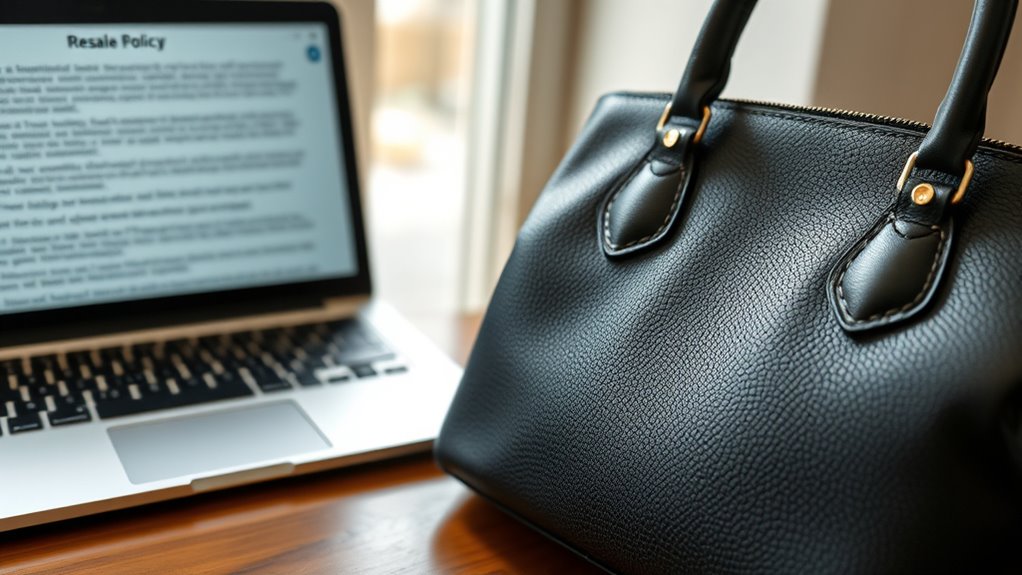
When reselling designer bags online, you need to be aware of brand trademark limitations that can restrict your listings. It is crucial to follow each brand’s resale policies to avoid legal issues or account suspensions. Staying informed helps you navigate these restrictions smoothly and run a compliant resale business. Incorporating brand restrictions into your understanding of resale policies can further help you stay compliant and avoid potential pitfalls.
Brand Trademark Limitations
Managing brand restrictions and resale policies is crucial when reselling designer bags online, as many luxury brands enforce strict trademark protections to control how their products are sold and represented. To stay compliant, you need to understand that:
- Counterfeit prevention is a priority; brands actively monitor for fake listings to protect their reputation and consumers.
- Brand licensing restricts who can sell authentic products, meaning unauthorized resellers risk legal action.
- Brand trademarks limit how you can use logos, images, or branding elements in your listings, ensuring the brand’s image remains intact.
- Participating in remote hackathons can help develop innovative solutions for verifying authentic products and protecting brand integrity.
Resale Policy Compliance
Managing brand restrictions and resale policies is essential for ensuring your online resale business stays compliant and avoids legal issues. Different brands have specific rules about authorized resellers, resale platforms, and marketing strategies. To stay within these boundaries, you must carefully review each brand’s resale policy and ensure your sourcing is ethical. This helps protect your reputation and builds trust with customers. Additionally, understanding water-related concepts can help you navigate the importance of maintaining authenticity and adherence to brand standards in your resale practices.
Choosing the Right Platforms for Reselling

Choosing the right platform is essential to successfully resell designer bags online. It influences your profits, reputation, and ease of selling. Consider these key factors:
- Marketplace Fees – Some platforms charge higher fees, eating into your margins. Look for options with reasonable rates to maximize profits.
- Seller Reputation – A reputable platform attracts more buyers and offers better protection. Ensure the site values trust and transparency.
- Audience Fit – Choose a platform popular among luxury item buyers, increasing your chances of quick, profitable sales.
- Security Measures – Platforms with robust AI security features help protect your transactions and personal data from cyber threats.
Crafting Clear and Accurate Product Listings
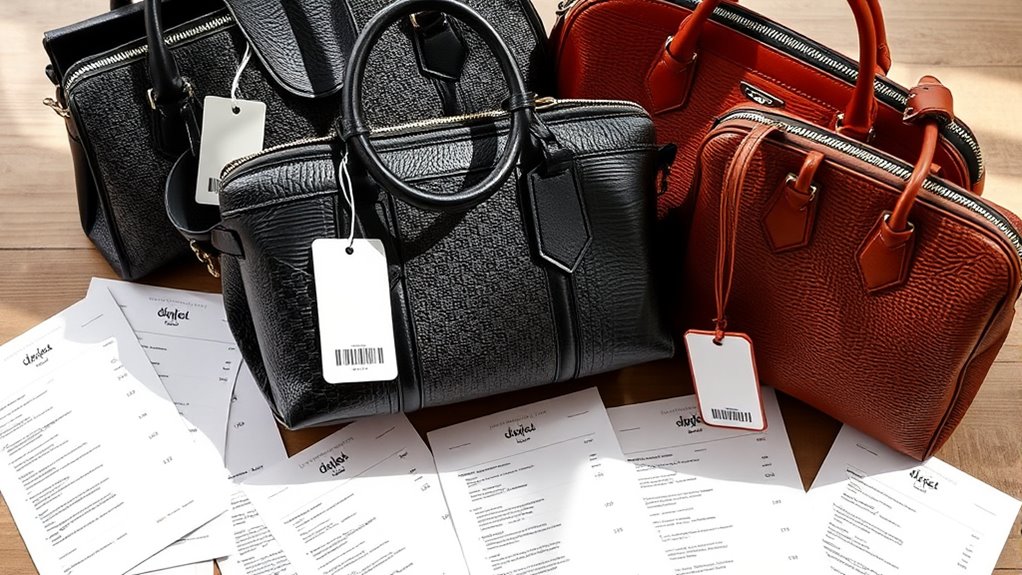
Creating clear and accurate product listings is essential to attract buyers and build trust. Start by providing detailed descriptions of each designer bag, noting brand, model, condition, and any unique features. Use honest language to reflect the actual condition, which helps set realistic expectations and reduces disputes. Incorporate effective pricing strategies by researching comparable listings to stay competitive and transparent. Highlight key details that justify your price point, whether it’s rarity or condition. Pay attention to customer feedback in your listings—positive comments about clarity or accuracy can reinforce credibility. Include high-quality photos from multiple angles to give buyers a true sense of the item. Well-crafted listings demonstrate professionalism, boost buyer confidence, and ultimately lead to more successful sales. Additionally, understanding the market dynamics of designer goods can help you better position your listings within the competitive landscape.
Managing Customer Transactions and Dispute Resolution

Handling customer transactions effectively is crucial for maintaining trust and ensuring smooth sales. Clear communication about your customer refund policies helps set expectations upfront, reducing misunderstandings. When disputes arise, having a structured dispute escalation procedure ensures issues are addressed fairly and promptly. Consider these key steps:
Effective transaction handling builds trust and prevents misunderstandings. Follow clear steps to resolve disputes fairly and promptly.
- Respond promptly to customer concerns to demonstrate your commitment.
- Evaluate the situation objectively, referencing your refund policies and records.
- Escalate disputes to higher management or mediation if resolution isn’t reached initially.
- Incorporating dispute resolution strategies can also help in maintaining positive customer relationships.
Handling Taxes and Business Licensing Requirements

Since managing taxes and business licensing is vital for legal compliance and long-term success, you need to stay informed about the specific requirements in your area. Sales tax collection is often mandatory when reselling designer bags, so you should register with your state’s tax authority and collect the appropriate amount from buyers. Additionally, obtaining the right business licensing is essential to operate legally. This may include a general business license or a reseller’s permit, depending on your location. Failing to handle these obligations can lead to fines or legal trouble. Regularly review local regulations to make sure you’re meeting all sales tax and licensing requirements. Staying compliant helps protect your business and builds trust with your customers.
Protecting Your Business From Counterfeit and Fraudulent Sales
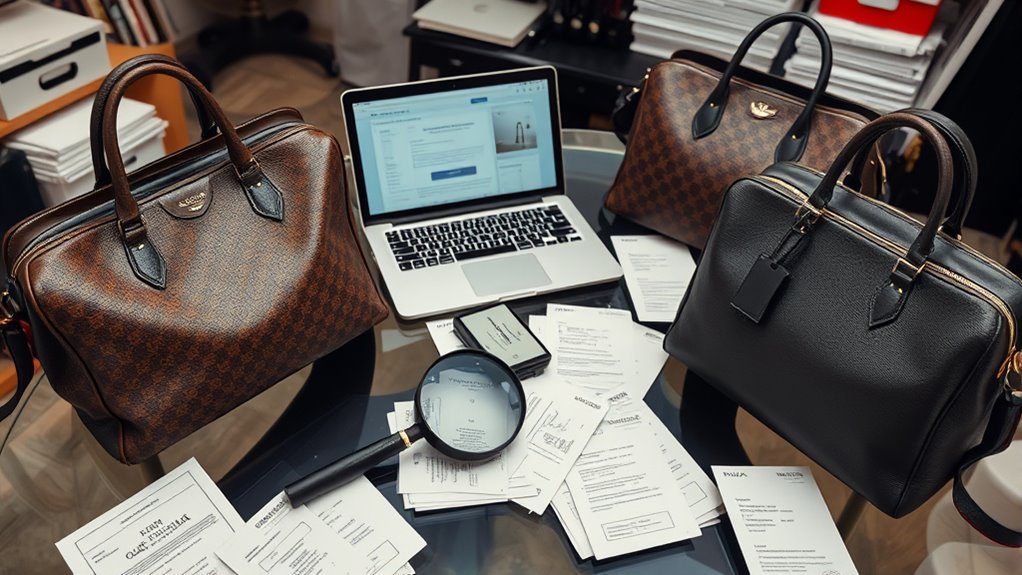
As you navigate the world of online designer bag reselling, safeguarding your business against counterfeit and fraudulent sales becomes increasingly important. Protecting your reputation and market valuation hinges on verifying authenticity and maintaining customer privacy. To do this effectively:
Safeguard your resale business by verifying authenticity and protecting customer privacy to build trust and credibility.
- Implement thorough authentication processes to confirm genuine products, reducing the risk of counterfeit sales.
- Use secure payment systems that protect customer privacy and prevent fraud.
- Educate your customers about how to identify authentic bags, fostering trust and transparency.
Frequently Asked Questions
What Are the Common Legal Penalties for Reselling Counterfeit Designer Bags?
When you resell counterfeit designer bags, you face serious legal penalties, including hefty fines and potential jail time. Counterfeit penalties are designed to deter intellectual property violations, which harm original brands and consumers. By knowingly selling fake items, you risk being sued for damages, losing your inventory, and damaging your reputation. It’s vital to understand these risks and avoid engaging in activities that infringe on intellectual property rights.
How Can I Ensure My Reselling Business Complies With International Trade Laws?
You’re about to navigate a maze, but don’t worry—staying compliant is easier than you think. To guarantee your reselling business follows international trade laws, always research import/export regulations and verify that your items don’t infringe on intellectual property rights. Keep detailed records, source authentic products, and stay updated on legal changes. Doing so helps you avoid costly penalties and builds a trustworthy brand in the global marketplace.
Are There Specific Disclosures Required When Selling Pre-Owned Designer Items?
When selling pre-owned designer items, you need to meet disclosure requirements by providing authenticity declarations to assure buyers of genuine products. Clearly state if the item is pre-owned, and include details about its condition and provenance. These disclosures help maintain transparency and comply with legal standards, protecting both you and your customers. Always check platform policies and local laws to guarantee you’re meeting all disclosure requirements for a trustworthy resale business.
Can I Resell Designer Bags Bought From Outlet Stores Legally?
Ever dreamed of turning outlet store finds into a side hustle? You can resell designer bags from outlet stores legally, but beware of outlet store restrictions—they often limit resale. To avoid trouble, check if reseller licensing requirements apply in your area. While it’s tempting to skip the paperwork, staying compliant guarantees your “shopping spree” doesn’t turn into a legal nightmare. Reselling smartly keeps your profits, and reputation, intact.
What Rights Do Designers Have Over Resellers Using Their Brand Names Online?
You should understand that designers have rights over their brand names to prevent trademark infringement. They actively protect their brands through legal measures, meaning resellers must use the brand name correctly and avoid misleading consumers. If you misuse a brand, you risk legal action from designers to defend their brand protection. Always guarantee your online reselling practices respect these rights to avoid infringing on trademarks and facing potential legal consequences.
Conclusion
Managing the world of online designer bag reselling involves understanding legal nuances and protecting your reputation. By respecting intellectual property rights, verifying authenticity, and staying compliant with brand policies, you set yourself up for success. Are you ready to build a trustworthy business that stands out in a competitive market? With careful attention to documentation, platform choices, and fraud prevention, you can turn your passion into a sustainable venture—while safeguarding your reputation along the way.
